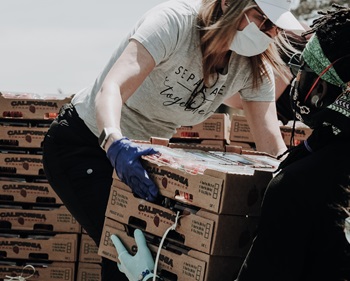Prioritizing Food to People: Packaging, Plastics and Avoiding Food Waste
By: Marjorie DePuy, Senior Director, Supply Chain and Sustainability, FMI
According to data from ReFED and Feeding America, the number of Americans struggling with hunger since the COVID-19 pandemic has risen from 40 million to a staggering 54 million people.
Our members have stepped up in these difficult times—not only as an essential workforce to provide food to American households, but also in giving to local communities with food and financial donations, and food rescue initiatives. Still, there is more that can be done.
Food Donation Details
For companies looking to engage with their food donation partners in a new way, understanding donation options and liability is a key first step. If you have questions about federal incentives for businesses to donate food, check out the recent USDA post published by Jean Buzby, the USDA Food Loss and Waste liaison. This includes information about the Good Samaritan Act, which offers liability protection for businesses that wish to donate food in addition to tax deduction and procurement contract language that may be helpful as you evaluate additional opportunities with your donation plans.
Packaging and Plastics Considerations
A key element to reducing food waste is protecting the product through the entire supply chain for enjoyment by the end consumer. Global awareness around our plastic waste problem has collided with the COVID-19 pandemic resulting in food packaging and food safety gaining added attention. FDA states there is no evidence that COVID-19 is transmitted by food or food packaging. Still, consumers have recently relied on extra packaging for peace of mind or simply for added home delivery. Packaging teams in the food industry have and continue to actively look at their procurement practices when making packaging decisions. Products are typically put through a rigorous process of testing for a variety of parameters—in particular, is the packaging appropriate and made of safe material for food contact and will it be able to travel through the food supply chain.
Packaging is not only an art, but also a science. It’s a system under great scrutiny when it comes to all aspects of sustainability. We need materials sourced with minimal impact to stand up to distribution, storage requirements and protect our food from field to fork, so none of us must watch food go to waste.
Ongoing Industry Discussions
To dive deeper into these intersectional issues, join us next week at FMI’s FreshForward, where CEO of Ahold Delhaize USA, Kevin Holt, shares essential insights on fresh foods and sustainability followed by an engaging panel discussion between executives at Wegmans, Albertson's and Unilever around the industry’s ongoing work to drive more sustainable outcomes in our food and consumer products. This panel discussion will be followed by a facilitated small group discussion.
Our food industry has delivered during this pandemic in ways large and small, literally, and figuratively. As challenging as it is, we have truly been reminded that we are all in this together.


No comments:
Post a Comment